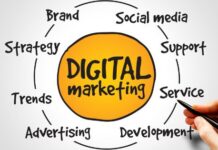In today’s fiercely competitive digital landscape, gaining online visibility and customer engagement constantly challenges businesses. Pay-per-click (PPC) advertising has become an indispensable tool for businesses to achieve their marketing objectives. PPC is a form of online advertising that allows businesses to place ads on search engines, social media platforms, and other websites, and pay only when a user clicks on their ad. With this, businesses can target specific audiences, increase brand awareness, and drive traffic to their website. In this highly competitive market, PPC is an effective and efficient way to reach potential customers and grow business.


What is PPC?
PPC is a digital advertising model where advertisers pay a fee each time their ads are clicked. Essentially, it’s a way of buying visits to your site rather than earning them organically through search engine optimization (SEO). PPC is a popular form of online advertising because it allows businesses to reach their target audience quickly and efficiently. In PPC, advertisers bid on keywords related to their business, displaying their ads to users who search for those keywords. The ads appear at the top of the search engine results page (SERP), making them highly visible to users.
PPC advertising is available on search engines like Google and Bing and social media platforms like Facebook, Instagram, and LinkedIn. The ads can take various forms, including search, display, video, and shopping ads. PPC advertising offers a range of benefits to businesses, including increased visibility, targeted marketing, and better ROI compared to traditional advertising methods.
The importance of PPC for businesses
PPC advertising is critical for businesses of all sizes, from startups to multinational corporations. PPC offers businesses the opportunity to reach their target audience quickly and efficiently. With PPC, businesses can target specific demographics, locations, and interests, ensuring that their ads are seen by those most likely to be interested in their products or services.
PPC advertising is also highly measurable, allowing businesses to track their ROI accurately. This makes it easier for businesses to determine the effectiveness of their campaigns and adjust their strategies accordingly. Additionally, PPC advertising is incredibly flexible, allowing businesses to set their budget, target audience, and ad format to meet their needs.
Advantages of PPC over traditional advertising methods
PPC advertising offers several advantages over traditional advertising methods, including:
Cost-effective
One of the biggest advantages of PPC advertising is that businesses only pay when someone clicks on their ad. This means businesses can set their budget and ensure they only pay for the clicks they receive. This type of advertising is more cost-effective than traditional advertising methods, such as print or TV ads, where businesses pay a fixed amount regardless of how many people see or interact with their ads.
Targeted marketing
PPC advertising allows businesses to target specific demographics, locations, and interests. This means businesses can display their ads to people most likely interested in their products or services. This targeted marketing approach is more effective than traditional advertising methods, where businesses have little control over who sees their ad.
Measurable ROI
PPC advertising is highly measurable, allowing businesses to track their ROI accurately. This means that businesses can determine the effectiveness of their campaigns and adjust their strategies accordingly. Measuring an ad’s impact on sales or customer engagement can be challenging with traditional advertising methods.
Greater control
PPC company in Ahmedabad offers businesses greater control over their ad campaigns. Businesses can set their budget, target audience, and ad format to meet their needs. This level of control is not possible with traditional advertising methods, where businesses have little control over who sees their ad or how it is displayed.
Understanding the different types of PPC campaigns
There are several types of PPC campaigns available, including:
Search ads
Search ads are the most common type of PPC advertising. They appear at the top of the search engine results page (SERP) when a user searches for a specific keyword. Search ads are highly targeted, allowing businesses to display their ads to users actively searching for their products or services.
Display ads
Display ads are visual ads that appear on websites, apps, and social media platforms. Display ads can be in the form of banners, pop-ups, and videos. Display ads are a great way for businesses to increase brand awareness and reach a broader audience.
Video ads
Video ads are a form of PPC advertising on video-sharing platforms like YouTube. Video ads can be in the form of pre-roll ads or in-stream ads. Video ads are an excellent way for businesses to engage with their audience and tell their brand story.
Shopping ads
Shopping ads are a form of PPC advertising that allows businesses to display their products on the search engine results page (SERP). Shopping ads are highly visual and display an image of the product, the price and the retailer’s name. Shopping ads are an effective way for businesses to promote their products and drive traffic to their website.
Setting up your PPC campaign
Setting up a PPC campaign can be a complex process, but it’s essential to get it right to ensure that you achieve your marketing objectives. Here are the steps to set up a successful PPC campaign:
Define your goals
The first step in setting up a PPC campaign is to define your goals. What do you want to achieve with your campaign? Do you want to increase website traffic, generate leads, or boost sales? Defining your goals will help you determine the best strategy to achieve them.
Choose your platform
The next step is to choose the platform where you want to run your ads. Google Ads is the most popular PPC advertising platform, but other options, such as Facebook and LinkedIn Ads, are available. Choosing the right platform will depend on your target audience and marketing objectives.
Keyword research for PPC
Keyword research is a crucial step in setting up a PPC campaign. You need to identify the keywords your target audience is searching for and ensure that your ads appear when those keywords are searched. Keyword research will also help you determine each keyword’s cost per click (CPC).
Creating effective ad copy
Creating effective ad copy is critical to the success of your PPC campaign. Your ad copy should be attention-grabbing, concise, and relevant to your target audience. It should also include a clear call-to-action (CTA) to encourage users to click on your ad.
Optimizing landing pages for PPC
The landing page is a crucial element of your PPC campaign. Your landing page should be optimized for conversions and provide a seamless user experience. Your landing page should be relevant to your ad copy and include a clear CTA.
Tracking and analyzing your PPC campaigns
Tracking and analyzing your PPC campaigns is crucial to determining the effectiveness of your ads. You need to track your ad performance to determine which ads generate the most clicks, conversions, and sales. This will help you adjust your strategy and improve your ROI.
Common mistakes to avoid in PPC
PPC advertising can be a complex process, and there are several mistakes that businesses can make. Here are some common mistakes to avoid in PPC:
Not defining your goals
Defining your marketing objectives is a common mistake in PPC advertising. With defined goals, it’s easier to determine the success of your campaign and adjust your strategy accordingly.
Not targeting the right audience
PPC advertising is all about targeting the right audience. If you’re not targeting the right audience, your ads will not be effective, and you’ll waste your budget.
Poorly written ad copy
Ad copy is critical to the success of your PPC campaign. Poorly written ad copy can lead to low click-through rates (CTR) and a low ROI.
Not optimizing landing pages
Landing pages are critical to the success of your PPC campaign. If your landing page is optimized for conversions, you’ll retain potential customers and save your budget.
Maximizing your PPC budget
Maximizing your PPC budget is essential to achieving your marketing objectives. Here are some tips to make the most of your PPC budget:
Set a realistic budget
Setting a realistic budget is crucial to the success of your PPC campaign. You must determine how much you will spend on each click and adjust your budget accordingly.
Use negative keywords
You don’t want your ad to appear for negative keywords. Using negative keywords will help you avoid irrelevant clicks and save your budget.
Monitor your ads regularly
Monitoring your ads regularly will help you determine which ads generate the most clicks, conversions, and sales. This will help you adjust your strategy and maximize your ROI.
PPC vs. SEO: Which one to choose?
PPC and SEO are popular digital marketing strategies, and businesses often wonder which one to choose. PPC is a paid advertising strategy that allows businesses to display their ads to users who search for specific keywords. Conversely, SEO is an organic marketing strategy that improves a website’s visibility in search engine results.
PPC is an effective strategy for businesses with quick results and a specific budget. SEO is a long-term strategy that requires ongoing investment and patience. The best strategy for your business will depend on your marketing objectives, budget, and target audience.
Hiring a PPC management agency
Hiring a PPC management agency can be a smart move for businesses that want to achieve the best results from their PPC campaigns. A PPC management agency can help you set up and optimize your campaigns, monitor your ad performance, and adjust your strategy accordingly. A PPC management agency can also help you save time and money by ensuring your budget is used effectively.
Conclusion
PPC agency is critical for the success of your business in today’s digital age. PPC allows businesses to target specific audiences, increase brand awareness, and drive traffic to their website. PPC company Ahmedabad offers several advantages over traditional advertising methods, including cost-effectiveness, targeted marketing, and measurable ROI. To set up a successful PPC campaign, businesses must define their goals, choose the right platform, conduct keyword research, create effective ad copy, optimize landing pages, and track and analyze their campaign’s performance. Businesses can achieve their marketing objectives and growth by avoiding common mistakes and maximizing their budget.






















